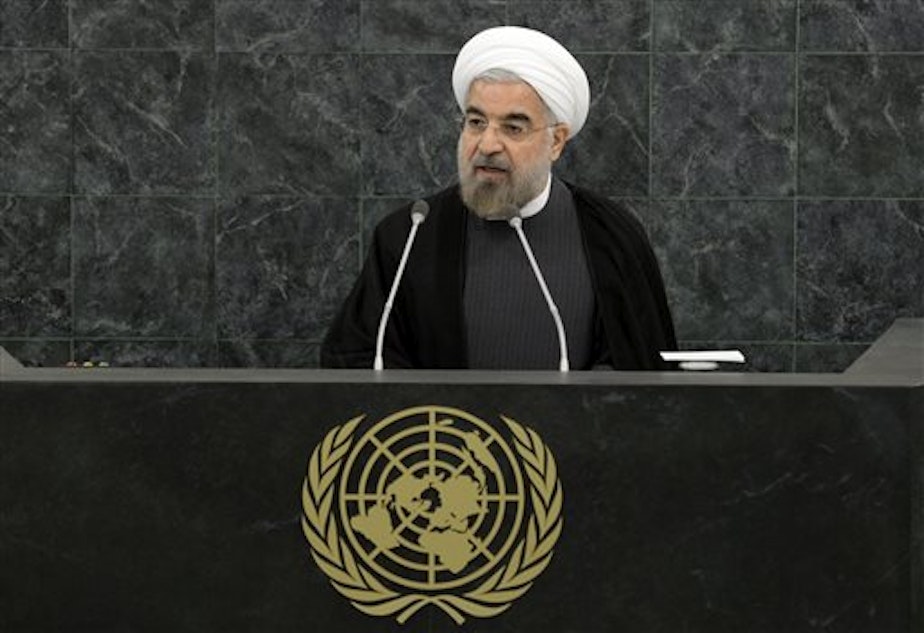Are Iran And The US Ready For Peace?

Iran’s new president Hassan Rouhani addressed the United Nations General Assembly on Tuesday. Although he and President Obama didn’t shake hands, the two leaders expressed their desire to open a dialogue.
Iran wants harsh economic sanctions lifted to help restore its economy. The US and other Western nations want to contain Iran’s nuclear program and to augment nuclear weapons inspections in that country.
Former CIA analyst Kenneth Pollack, now a Middle East expert at the Brookings Institution, sat down with Marcie Sillman to talk about what happened with Iran’s president this week at the annual meeting of the UN in New York.
He said that Rouhani’s speech was somewhat anti-climatic and directed more at the president’s audience back home more than the rest of the community. “We need to remember that Rouhani is also playing to two audiences just as President Obama is,” he said.
In a recent article, Pollack called Rouhani “the real deal” and urged Western leaders to take the president's overtures seriously. He explained that statement in more detail.
I think what we’ve seen of Rouhani over the 20 years he’s been a major player in Iran is that this is a guy who very much does want to change the direction that Iran is moving in. I don’t know whether he is ready to get rid of the Islamic Republic, but he seems to understand that the Iranian people want a different kind of government: one that treats them differently, one that provides for them better and one that does not make them pariahs in the world. I think that what he’s trying to do represents those real changes that he’s trying to bring about.
What’s important to note, according to Pollack, is just how fragmented the Iranian society really is. He explained that the vast majority of the Iranian people want to see an improvement in relations, but Rouhani also must contend with a smaller, but still very influential group of hard-liners who are “dead-set against any deal with the Americans.” This is the group that Pollack thinks will fight Rouhani tooth and nail.
Perhaps more confusing is the Iranian government’s structure. Though Pollack indicates that Rouhani is interested in broaching a deal with the US, the president will still need to make sure that Ayatollah Ali Khamenei is also on board.
The Supreme Leader is the ultimate decision maker in Iran. He’s got this very ill-defined role, but it’s clear that any issue that he wants to be the decider, he’s the decider. He’s deeply, deeply suspicious of the United States. Rouhani has got to make sure he’s comfortable with anything Rouhani produces.
Pollack said that there was at least one hopeful sign from Khamenei: two weeks ago the Ayatollah spoke in front of Iran’s Revolutionary Guards – “the hardest of the hard-liners” – and made statements that Pollack believes represents that Iran was ready to explore the possibility of a deal with the US.
Besides the Iranian people’s general unhappiness, Pollack sites the sanctions against the country as a major factor in this evolving stance from Iran.
I think that the best evidence that the sanctions were an important contributing element was the fact that right out of the gate Rouhani made getting rid of the sanctions his biggest priority. He’s now saying he wants this wrapped up in three to six months.
One major concern in the relationship with the US is Iran’s nuclear program. Pollack said that while there is no evidence to indicate that the Iranians have a nuclear arsenal, “it seems pretty clear that this is a program designed to produce nuclear weapons someday.” But he said that Iran has shown signs over the years that they are amenable to the idea of not creating a nuclear arsenal.
Pollack also said that the US has been inconsistent in its stance on nuclear proliferation, particularly in regards to allies like Great Britain and France. He said that though it might be preferable for Iran to give up its nuclear program, it’s not very likely they will entirely.
It’s not just Iran that will need to come to terms with forward negotiations. Pollack also thinks that Obama will also be facing a fight going forward with negotiations.
I think that there is strong desire to take advantage of this, but what’s unclear is how much political courage there is. This is going to be a very tough sell. We’ve already heard Israel’s Prime Minister Netanyahu voice all kinds of reservations about this. Our Arab allies are more quiet about it, but they have the same concerns.
In some ways the Arabs may be even more concerned. The Israelis have their own strategic and military capabilities that they can fall back on. The Arabs are a lot closer to Iran and they typically feel more threatened by Iran than the Israelis do. I think the Congress is going to reflect the concerns of our allies.
Pollack predicts that the only way for Obama to win in this political struggle is to negotiate in good faith to show Iran that the US is serious in its stances.
I think the only way he wins is he demonstrates that political courage. If Rouhani is willing to put a real deal on the table, I think we should do the same. Then Obama’s going to need to go and sell it. He’s going to need to say to the American people, the American Congress and our allies: “This is a good deal. It may not be perfect but it is good enough. And if we hold out for perfect, we’re not going to get anything and we may find ourselves in another war.”
Produced by Arwen Nicks.

